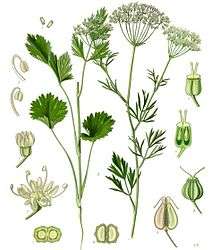Definify.com
Webster 1913 Edition
Anise
An′ise
(ăn′ĭs)
, Noun.
[OE.
anys
, F. anis
, L. anisum
, anethum
, fr. Gr. ἄνισον
, ἄνηθον
.] 1.
(Bot.)
An umbelliferous plant (
Pimpinella anisum
) growing naturally in Egypt, and cultivated in Spain, Malta, etc., for its carminative and aromatic seeds. 2.
The fruit or seeds of this plant.
Webster 1828 Edition
Anise
AN'ISE
,Noun.
An annual plant, placed by Linne under the genus Pimpinella. It grows naturally in Egypt, and is cultivated in Spain and Malta, whence the seeds are imported. The stalk rises a foot and a half high, dividing into slender branches, garnished with narrow leaves, cut into three or four narrow segments. The branches terminate in large loose umbels, composed of smaller umbels or rays, on long footstalks. The flowers are small and of a yellowish white; the seeds oblong and swelling. Anise seeds have an aromatic smell, and a pleasant warm taste; they are useful in warming the stomach and expelling wind.
Definition 2026
anise
anise
English
Noun
anise (plural anises)
- An umbelliferous plant (Pimpinella anisum) growing naturally in Egypt, and cultivated in Spain, Malta, etc., for its carminative and aromatic seeds, which are used as a spice. It has a licorice scent.
- (US) Fennel
Usage notes
- Although fennel is widely referred to as anise (even in books and articles), such usage is considered incorrect by many.
Derived terms
terms derived from anise
|
Translations
plant
|
|
fennel — see fennel
See also
References
- ↑ Oxford English Dictionary, 1st ed. "anise, n." Oxford University Press (Oxford), 1884.
Anagrams
French
Verb
anise
- inflection of aniser:
- first-person and third-person singular present indicative
- first-person and third-person singular present subjunctive
- second-person singular imperative
Anagrams
Spanish
Verb
anise
